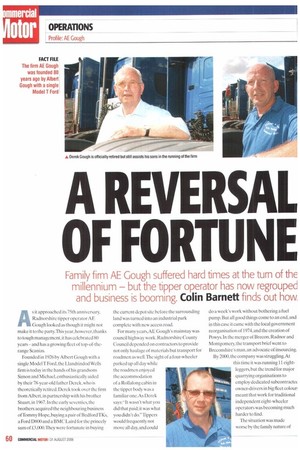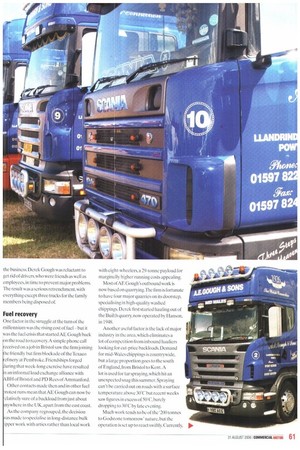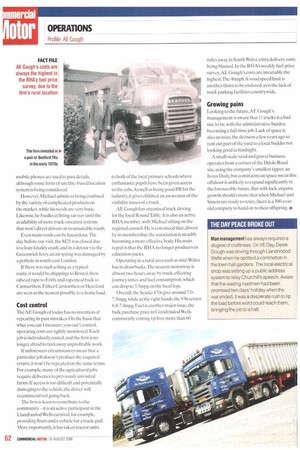A REVERSAL OF FORTUNE
Page 60

Page 61

Page 62

If you've noticed an error in this article please click here to report it so we can fix it.
Family firm AE Gough suffered hard times at the turn of the
millennium — but the tipper operator has now regrouped
and business is booming. Colin Barnett finds out how,
Asit approached its 75th anniversary, Radnorshire tipper operator AE Gough looked as though it might not make it to the party.This year, however, thanks to tough management, it has celebrated 80 years— and has a growing fleet of top-of-therange Scanias.
Founded in 1926 by Albert Gough with a single Model T Ford, the Llandrindod Wells firm is today in the hands of his grandsons Simon and Michael, enthusiastically aided by their 78-year-old father Derek,who is theoretically retired. Derek took over the firm from Albert, in partnership with his brother Stuart, in 1967. In the early seventies, the brothers acquired the neighbouring business of Tommy Hope, buying a pair of Bedford TKs, a Ford D800 and a BMC Laird for the princely sum of 0.000.They were fortunate in huying the current depot site before the surrounding land was turned into an industrial park complete with new access road.
For many years,AE Gough's mainstay was council highway work. Radnorshire County Council depended on contractors to provide not only haulage of materials but transport for roadmen as well.The sight of a four-wheeler parked up all day while the roadmen enjoyed the accommodation of a Rollalong cabin in the tipper body was a familiar one. As Derek says:"It wasn't what you did that paid; it was what you didn't do." Tippers would frequently not move all day, and could do a week's work without bothering a fuel pump. But all good things come to an end, and in this case it came with the local government reorganisation of 1974, and the creation of Powys. In the merger of Brecon. Radnor and Montgomery, the transport brief went to Breconshire's ma n, an advocate of insourcing.
By 2000, the company was struggling.At this time it was running 11 eightleggers,but the trend for major quarrying organisations to employ dedicated subcontractet owner-drivers in big fleet coloun meant that work for traditional independent eight-wheeler operators was becoming much harder to find.
The situation was made worse by the family nature of the business. Derek Gough was reluctant to get rid of drivers, who were friends as well as employees, in time to prevent major problems. The result was a serious retrenchment, with everything except three trucks for the family members being disposed of.
Fuel recovery
One factor in the struggle at the turn of the millennium was the rising cost of fuel—but it as the fuel crisis that started AE Gough back n the road to recoveiTA simple phone call eceived on a job in Bristol saw the firmjoining he friendly but firm blockade of the Texaco efinery at Pembroke. Friendships forged uring that week-long exercise have resulted n an informal load exchange alliance with BH of Bristol and PD Rees of Ammanford. Other contacts made then and in other fuel rotest runs mean that AE Gough can now be elatively sure of a back load from just about nywhere in the UK, apart from the east coast. As the company regrouped, the decision as made to specialise in long-distance bulk ipper work with artics rather than local work with eight-wheelers, a 29-tonne payload for marginally higher running costs appealing.
Most of AE Gough's outbound work is now based on quarrying.The firm is fortunate to have four major quarries on its doorstep, specialising in high-quality washed chippings. Derek first started hauling out of the Builth quarry, now operated by Hanson, in 1948.
Another useful factor is the lack of major industry in the area, which eliminates a lot of competition from inbound hauliers looking for cut-price backloads. Demand for mid-Wales chippings is countrywide, but a large proportion goes to the south of England, from Bristol to Kent. A lot is used for tar spraying, which hit an unexpected snag this summer. Spraying can't he carried out on roads with a surface temperature above 30'C but recent weeks saw figures in excess of 50 'Cbarely dropping to 30°C by late evening.
Much work tends to be of the '200 tonnes to Godstone tomorrow' nature. but the operation is set up to react swiftly. Currently, mobile phones are used to pass details, although some form of satellite-based location system is being considered.
However. Michael admits to being confused by the variety of complicated products on the market. while his needs are very basic. Likewise, he baulks at fitting sat-nay until the availability of more truck-oriented systems that won't direct drivers on to unsuitable roads.
Even main roads can be hazardous. The day before our visit,the M25 was closed due to a four-fatality crash, and in a detour via the Greenwich ferry, an air spring was damaged by a pothole in south-east London.
If there was such a thing as a typical route, it would be chippings to Bristol. then oilseed rape to Erith, and rapemeal back to Carmarthen. Either Carmarthen or Hereford are seen as the nearest possible to a home load.
Cost control
The AE Gough of today has no intention of repeating its past mistakes. On the basis that what you can't measure, you can't control, operating costs are tightly monitored. Each job is individually costed, and the firm is no longer afraid to turn away unprofitable work.
If unforeseen circumstances mean that a particularjob doesn't produce the required return, it won't be repeated on the same terms. For example, many of the agricultural jobs require deliveries to previously unvisited farms. If access is too difficult and potentially damaging to the vehicle, the driver will recommend not going back.
The firm is keen to contribute to the community—it is an active participant in the Llandrindod Wells carnival, for example, providing floats and a vehicle for a truck-pull. More importantly it has taken tractor units to both of the local primary schools where enthusiastic pupils have been given access to the cabs. As well as being good PR for the industry, it gives children an awareness of the visibility issues of a truck.
AE Gough has organised truck driving for the local Round Table. It is also an active RHA member, with Michael sitting on the regional council. He is convinced that, driven by its membership, the association is steadily becoming a more effective body. His main regret is that the RHA no longer produces its education packs.
Operating in a rural area such as mid-Wales has its drawbacks. The nearest motorway is almost two hours away by truck.effecting journey times and fuel consumption, which can drop to 3.5mpg on the local legs.
Overall, the Scania 470s give around 7.07.5mpg. while in the right hands, the V8s return 6.8-7.0mpg. Fuel is another major issue, the bulk purchase price in Llandrindod Wells consistently costing lpilitre more than 60 miles away in South Wales, extra delivery costs being blamed. In the RHA's weekly fuel-price survey,AE Gough's costs are invariably the highest:the 40mph A-road speed limit is another thorn to be endured, as is the lack of truck parking facilities countrywide.
Growing pains
Looking to the future,AE Gough's management is aware that 11 trucks is a had size to be, with the administrative burden becoming a full-time job. Lack of space is also an issue, the decision a few years ago to rent out part of the yard to a local builder not looking good in hindsight.
A small-scale sand and gravel business operates from a corner of the Ddole Road site, using the company's smallest tipper, an Iveco Daily, but constraints on space mean this offshoot is unlikely to expand significantly in the foreseeable future.But with luck, organic growth should ensure that when Michael and Simon are ready to retire, there is a 100-yearold company to hand on to their offspring. •


















































































































































































